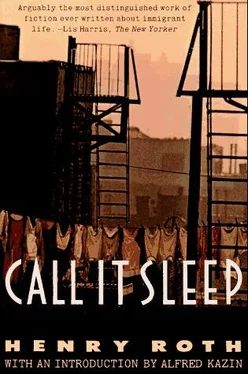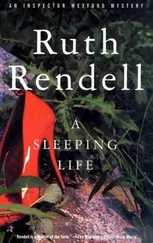“Ach!” Exasperatedly she flung her hand down to her side. “Where are my senses? What am I doing?” She crouched down before the stove, buried the poker into the ashes with a provoked stab. “Have you ever seen your mother so mixed? So lost? God have mercy, my wits are milling! Ach! I go here and I’m there! I go there and I’m here. And of a sudden I’m nowhere.” She lifted the stove lid, threw a shovelful of coal into the red pit. “David darling, you were saying—?” Her voice had become solicitous, penitent. She smiled. “You were saying what? Light? Why what?”
Heartened by her new interest, he began again eagerly. “What makes it burn?”
“The gas? Gas of course.”
“Why?”
“One lights it — with a match. And then — Er. And then—” As abruptly as her mood had changed a moment ago, it reverted again. That odd look of strain spindled the corners of her eyes, her face resumed that hunted, alert look. “And then one turns — the — the—”. She broke off. “Only a moment, darling! I’m going into the front room.”
That was the end! He wasn’t going to talk to her any more! He wasn’t going to ask her anything. No, even if she talked to him, he wouldn’t answer. Sullenly, he slumped down into his chair and sullenly watched her hurry up the steps into darkness … heard the window slide open, softly, cautiously … and then close again … She came down.
“Not even the cold air can rouse me.” Her fingers drummed nervously on the ridge of a chair. “Nothing does any good. My head is — Oh, I’m sorry, David, beloved! I’m sorry! I didn’t mean to run off in the middle of answering you.” She came over, bent down and kissed him. “Do you forgive me?”
Unappeased, he regarded her in steady silence.
“Offended? I shan’t do it again! I promise!” Where the broad waxen plane of her cheeks curved into the chin, small dents of contrition appeared — the very furthest away a smile could get from the distracted brown eyes, the creased brow. She shook herself. “Er … Burns, you said. Burns! Everything burns! Yes! Or almost. Kerosene, coal, wood, candles, paper, almost everything. And so gas — at least I think so. Er … And so gas, you see? They keep it in great vats, you know. Some tall — like the ash-cans out in the street, some short, like drums, only bigger. I don’t understand them.”
“But mama!” He wasn’t going to permit her to pause; she would fade back into her old mood if he did. “Mama! Water doesn’t burn when you throw a match in a puddle.”
“Puttle?” she repeated. “What is puttle? Your Yiddish is more than one-half English now. I’m being left behind.”
“Puddle. It’s water — in the street — when it rains sometimes.”
“Oh! Water. No, tears sometimes — No! You’re right. Water doesn’t burn.”
“Is there always a — something burning — when it’s light — like that!”
“Yes I think so. When I was a girl, the goyim built an ‘altar’ near a town some distance from Veljish because two peasants saw a light among the trees — yet nothing burning.”
“What’s a — what you said? Altar?” It was his turn to be puzzled. “Means old man?”
“No!” She laughed shortly. “An altar is a broad stone — about so high.” Her downturned palms impatiently leveled the air at bosom’s height. “They have a flat top. So. And because the ground was holy, they fenced it in.”
“Because why? They saw a light and — and nothing burned? So that was holy?”
“Yes. So it pleased them to say. I suppose that was because Moses too saw a tree on fire that didn’t burn. And there the gound was also holy.”
“Oh.”
“Yes. And when you begin going to cheder you’ll know more about these things than I do.” She stopped pacing, moved abruptly toward the china-closet. “I think I’ll set the table — do something.”
“Was it holy?” He drew her on.
“What? The light the peasants saw? Ach, nonsense! My father said that the truth was an old Jewess had been walking along the road through the woods. Where she was coming from I don’t know—”
She paused again. Three plates had been taken from the china closet and set on the table. The fourth, still in her hand, kept fluttering back and forth as though it were impossible for her to decide whether to set it on the table or to replace it on the stack she had taken it from. Finally, with a throaty exclamation, she set it on the table — before the chair on which Luter usually sat.
“Yes! So! Oh!” Her head went back as if returning thought were an impact. “Yes. Coming home, she was. Without doubt. And on the way, dusk overtook her. Yes. It was Friday. Now it chanced that she had candles with her — or so my father said, though he never said why. Perhaps she foresaw that she would be delayed. There’s no telling what women will do when they’re pious.” Her lips pressed together and she reddened ever so faintly setting the clinking silverware beside Luter’s plate. “She foresaw. Let us say, she foresaw. And with night coming on, she stopped beside the road and lit the candles and prayed over them as you’ve seen me pray. And having prayed, went on, leaving them lit — a Jew may not tamper with the candles once they’re burning and the prayer said. Then these peasants came along at night. And devout as she or more perhaps—” With a slight, spattering sound from the end of her lip, one cheek eddied in; she set the cup and saucer above Luter’s plate. “And perhaps drunk or surely dull-witted, saw the light in the woods — so my father said — and ran back and roused the village. They saw it and saw it vanish, and approaching, found nothing, heard nothing, only the sound of the woods. What more could they want? Priests came and high priests and consecrated the place.” Her eyes, momentarily meditative, kindled again, whisked to the door. She was listening again.
“Didn’t the candles leave another candle?” David strove to force her attention back again. “Like our candles? It’s water and candles.”
She shrugged impatiently. “Who bothered to look? The ground was holy; people soon remembered having seen angels; and there’s an end. And why hunt for candle-drippings. The altar did the village a mass of good.”
“How?”
“People, benighted ones, they came from all over Austria. They brought their sick, their maimed. They asked aid, they prayed for the dead and for better fortune. And they still do. And—” She paused, almost losing the thread, but regained it with a jolt. “While they were there, they had to eat, they had to buy things, they had to sleep somewhere. Fear not, those little candles kindled the day for the storekeepers in Lagronow. You see?”
“Yes, mama.”
“So much did they benefit Lagronow that Jews, merchants, in other villages also left a burning candle here or there. It never succeeded again.”
“But that wasn’t a real one,” he reminded her. “That wasn’t a real light. And — and without burning. But Moses, he—”
“Sh!” Sudden and sharp her warning.
David listened: The quick creak of the outer doorway. The slow and heavy footfall, carpet-muffled. That was his father’s way, a thrust of impatience followed by deliberation.
His mother, looking very pale, had opened the door a crack and stood there with one ear pressed against it. No sound of voices drifted up, no interweaving of a second footfall. She drew back, staring, shut the door carefully, sighed, but whether out of relief or apprehension, there was no telling, then stood attentive, waiting for him to enter.
In a few seconds, he did, and David knew by the very way the door swung open that his father was irritated. He came in — alone. The muscles under the dark jaws were bumpy, distinct, like cords twisted about and bulging. His eyes held a steady glower.
Читать дальше












